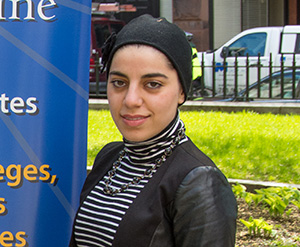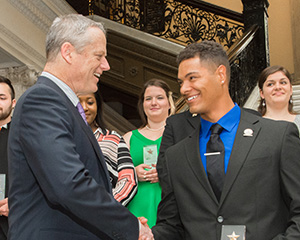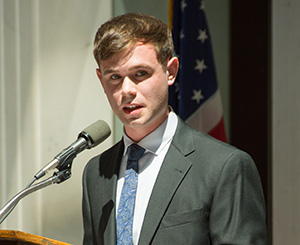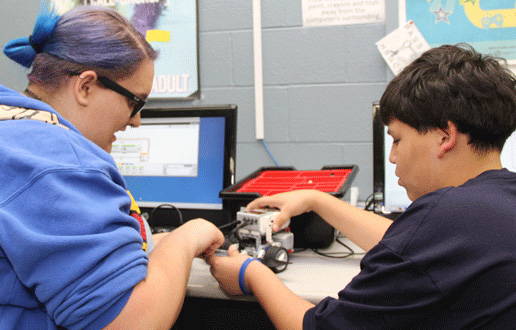


The DHE’s annual 29 Who Shine awards call attention to the pivotal role that higher education plays in producing a well-educated citizenry and workforce for the Commonwealth. Each year, the Governor recognizes 29 outstanding graduates, one from each public campus, who have demonstrated a commitment to serving others.
Sondos Alnamos from Bunker Hill Community College grew up near Damascus, Syria. She was visiting the U.S. when war broke out in her homeland, claiming the lives of many loved ones and changing her choice of a career. Sondos earned a BHCC degree in biomedical engineering with the goal of one day designing artificial organs and limbs for victims of conflict.
Travon Godette served as a Training Active Bystanders (TAB) Delegate and chair of the Cross-Cultural Symposium at Westfield State University. An NCAA national track champion, he passes along his love of sports by volunteering with the Westfield Boys and Girls Club and the Special Olympics.
As student member on the University of Massachusetts Board of Trustees, UMass Dartmouth’s Jacob Miller initiated the first Student Trustee Advocacy Program, bringing together student leaders to meet with state legislators and advocate for higher education funding. While serving as a legislative intern for Senator Mark Montigny, Jacob worked on health care legislation that made it easier for students to remain with less expensive plans under the state's Health Connector. The legislation saves students an average of $2,000 per year.
Massachusetts Maritime Academy’s emergency management (EM) program has built civic learning and public service into a program that is designed to teach students how to prepare for, respond to, and recover from disasters.
“It’s important for students within the (Emergency Management) major to get a feel for the community they are going to deal with and gain a sense of empathy and a sense of perspective,” says Tom Lennon, EM program chair. “So we build the program around that mindset.”
It starts with the freshman year experiential learning partnership with Habitat for Humanity, includes at least one public service co-op, and ends with designing and running real emergency response exercises through the EM Capstone Project. Through these programs, EM students work with organizations locally and all over the world to learn about different cultures and communities.
For the last six years, the EM program has coordinated a co-op in Île-à-Vache, Haiti (pictured above) in partnership with the U.S. Embassy and various Haiti-based NGOs. Among many projects, students have worked with local government to develop portable water solutions for the island, and coordinated a shipment of 15,000 adult diapers for an orphanage with severely handicapped children.
Locally, the EM program works with the Barnstable County Regional Emergency Management Planning Committee to identify vulnerabilities within communities in Southeastern Massachusetts, and to then develop a structured EM exercise to test local, state and federal resources ability to respond to the event.

When the Massachusetts Board of Higher Education announced the Vision Project in 2010, it aimed for the state’s public colleges and universities “to produce the best-educated citizenry and workforce in the nation.” Faculty and administrators pointed out that the goals focused more on education for careers than on education for citizenship. The Board agreed, and in 2014, the Board’s new Policy on Civic Learning provided a concrete definition of Civic Learning. Public campuses were called upon to make civic learning an “expected outcome” for all undergraduates, the first system of public higher education in the nation to take such an action.
Effective civic learning is more than just an “add-on” to the Big Three Degree Plan outlined in these pages. As students participate in civic learning—and especially in civic engagement beyond the classroom, or service learning—the knowledge and skills they develop can transfer to their work throughout the curriculum, and the experiences they undergo often increase their commitment to continue to graduation.
Many campuses have been doing this work for years with many of their students. At Holyoke Community College, for example, for each of the last 20 semesters three faculty members have designed and then taught new service learning courses: culinary arts students prepare meals for community events, nutrition students work with a food pantry, and engineering students teach young people in an after-school program how to build robots.
Lisa Mahon, professor of English and service learning faculty coordinator at Holyoke, says: “Many of the community-based learning projects help students gain awareness of community issues they might otherwise not know about and help them think more critically about the role they play in the community around them.”
Together, the campuses and the DHE are advancing the civic learning agenda in the following ways: